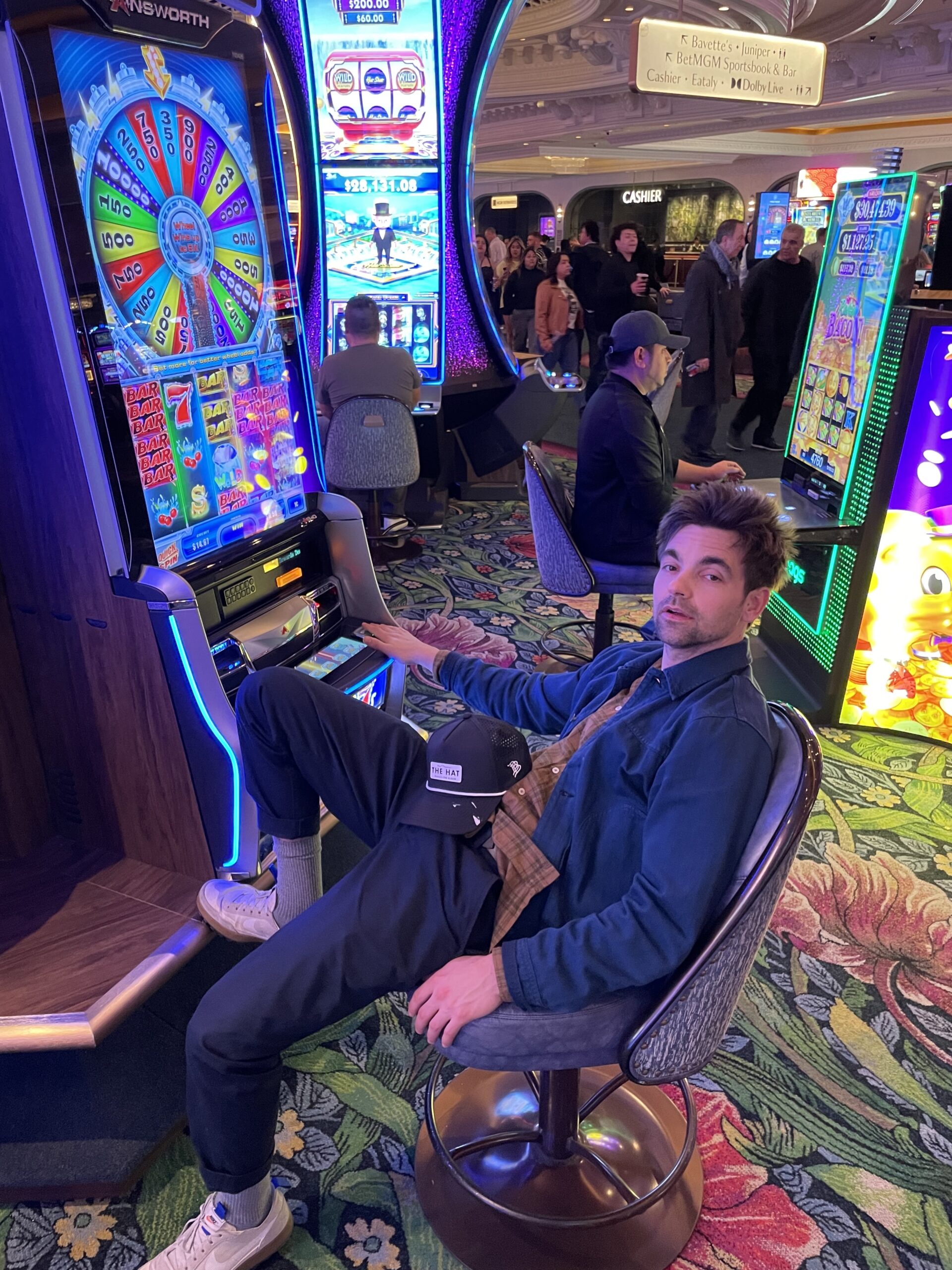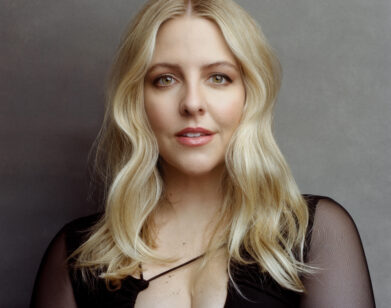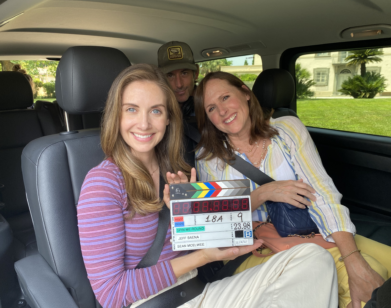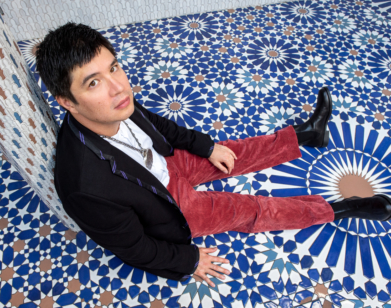in conversation
Drew Tarver and D’Arcy Carden on Moldy Theaters and Breaking Character
In the new season of The Other Two, during a visit to their mom’s McMansion, the Dubek family ensemble of Drew Tarver (Cary), Heléne Yorke (Brooke), and Molly Shannon (Pat) provide yet another showcase for the actors’ delicious chemistry and the writers’ near-perfect comedic timing. Three seasons in, The Other Two—the brainchild of former Saturday Night Live writers Chris Kelly and Sarah Schneider—continues to function as a joke-a-minute sitcom and a hilarious send-up of the “fucking industry,” as Wanda Sykes’ character, the profane agent to the Dubek’s kid brother-turned-pop star ChaseDreams, describes it.
In episode one, for instance, eager to celebrate his first big acting gig and newfound fame, Cary attends the premiere of Night Nurse, which is interrupted by the sale of the venue to Starbucks. The actor and comedian D’arcy Carden knows a thing or two about New York theaters, since she’s currently doing eight shows a week on Broadway in The Thanksgiving Play. From the green room at the Second Stage Theater, Carden called up Tarver, her decades-long friend and sketch comedy pal, to talk about breaking during scene, being concert buddies, and the new season of The Other Two. — ERNESTO MACIAS
———
DREW TARVER: How’s it going?
D’ARCY CARDEN: It’s going well now that you’re here.
TARVER: We’re already…
CARDEN: I know. I have a show in two hours.
TARVER: Okay, do you have nerves yet?
CARDEN: Can I tell you something crazy? I don’t get nerves for shows.
TARVER: Really?
CARDEN: We’ve been performing it for audiences for about a month. The first week or so of performances, I got super nervous and my hands would be shaking and stuff. I don’t get nervous at all. At all.
TARVER: Yeah. It would be weird if you were like, “There’s something about 250 people staring at me with me saying lines that just makes me feel comfortable.”
CARDEN: Never am I more myself [than I am on stage]. I did get really nervous the first couple nights, just that feeling that I know you’ve had especially for probably sketch shows more than improv shows like, “I did this to myself. I hate it. Why am I doing this? It’s my fault.”
TARVER: It’s the worst, yeah. I have actively murmured under my breath, “Why do I want to do this?” Right before I walk out. It’s a very scary thing to just wait to be revealed to a group of people, wait behind a piece of plywood and just stand there. It’s like, “All right, fill this seven minutes.”
CARDEN: Don’t disappoint anyone.
TARVER: I agree with you on that, don’t disappoint everyone. That’s my big thing and fuels me to try to do well, and I wonder if I need that. Does me picturing the audience as people who are furious at me, or will be if I mess up, fuel me to prepare enough to let them down?
CARDEN: There’s some mix between being confident and being afraid that I think fuels a good performance, whatever that means, whether it’s a talk show or a play or a day on set or an improv show or whatever. A little bit of confidence. I don’t know if it’s equal parts confidence and being afraid that you’re going to fuck up.
TARVER: I feel like that would be a tough thing to go in and be like, “If you’re not scared, you’re not doing it.” I feel like that’s not necessarily good advice, but it is true. If you don’t feel like you may throw up, you’re not acting.
CARDEN: “You’re bad at this. Pick another career, stupid.”
TARVER: Sometimes I feel this way and I try to not feel this way, but when I’m not scared anymore I’m like, “You’re not doing anything.”
CARDEN: I know. That is the weird thing, and I shouldn’t say I don’t get nervous for this play, but I get a rush of whatever, excitement or something. Now that we’ve done it night after night and it feels like it’s going well, whatever that means in the room, you can just settle into something. I am not a psychopath and yes, there is blood in my veins.
TARVER: Yes, yeah. Because if you view it like any other career, something you work really hard at to get to a place, like a doctor or something. I wouldn’t be excited if a doctor was like, “I got real nerves before this surgery.” It’s okay, I think, if we get to a point where we’re like, “Here’s a service I provide, I’m confident in it and I’m going into surgery. I’m not nervous.” Doctors aren’t three years into having their own practice being like, “I’m just not scared anymore.” They can be dentists.
CARDEN: It is such a weird one. We’ve been doing this show for a month and that’s eight shows a week.
TARVER: It’s called The Thanksgiving Play.
CARDEN: Okay, let’s just be clear to the people reading right now, Drew, we’ve known each other for 10 years or a little bit more maybe…
TARVER: That sounds right.
CARDEN: We’ve known each other through the Upright Citizens Brigade, we’ve been doing improv together for years, we’ve done a couple sketch shows, but mostly improv.
TARVER: When we reference our earlier scrappy portion of our career, that’s what we’re referring to. Improv and sketch shows in a theater that at times feel like, “Does this place have mold? How much mold does it have?” That’s what I liked about it, because it had the attitude of “Hey, if we’re not doing good, you came here into this basement.”
CARDEN: It is funny, obviously us having our foundation and background in improv, that helps us so much in a lot of the work that we do. I definitely think doing this comedy play helped me so much. In rehearsals for this play, if I did something funny it almost felt sacrilegious to do it again. I do something and the director or whoever would laugh, and then the idea is I should do that exact same thing the next time we ran the scene. It felt dirty and wrong to do it again.
TARVER: Right, because coming up we’re like, “We don’t do anything twice.” But that’s what a lot of comedians do, they’re like, “I improvised, I found a thing, now that’s in the act.”
CARDEN: Right, right. The show has been so weird, it’s been great, it’s been amazing, and it’s been such a different part of our comedy brain that we have.
TARVER: Yeah, totally. On set, you hear things like, “Oh, you’re a comedian, you’re a comedy actor, you need to get a laugh.” I’m like, “Yes, yes, yes.” I’m also like “No, I don’t need the laugh.” You really get used to dialing your performance in based on what an audience is laughing at. That’s also seeped into my personality a little bit too, where it’s like, “Hey, what do you want me to be like? Or maybe my personality was more adept like, “Okay, yeah. You tell me where to go.” Going back to shooting a single-camera show where people have to be quiet, they literally say, “Quiet on the set.”
CARDEN: Quiet on the set, we’re about to do comedy.
TARVER: “Everyone hush. We need to do funny stuff.” It was very jarring at the beginning, because you’re saying something and you’re laying into the delivery, and you can’t look off camera and be like, “Smiles? Any smiles?”
CARDEN: Literally, if anyone is laughing it ruins it.
TARVER: I eventually got used to it. Sometimes I want to be like, “Oh, yeah. I used to look behind the camera, I don’t do that anymore,” like some old, seasoned man. “Oh, yeah. No, I don’t seek validation anymore, I just do the take and return to the trailer.”
CARDEN: Is anybody on the set of The Other Two that’s the breakiest? Is that a word? Who breaks things?
TARVER: Me. We were at a press show the other day and they asked “Who breaks the most?” It was like, “Well, I think it’s Drew or maybe Heléne.” He’s very funny himself and has a lot of moments of doing bigger comedy, but a lot of times he’s responding to the funniest lines you’ve ever seen written down. Coming up, improv teachers would be like, “All right Drew, stop being cute and laughing at yourself and the audience. Commit.” There definitely was an element of the performance that I needed to be smiling through.
CARDEN: Yes, totally. I think even in the beginning of my improv career, I took not breaking really seriously. Then I don’t know when it changed into understanding that part of being on stage is laughing through most of the show. How dare I? Or I think of being on your podcast. I feel like people cover their mouths on most comedy podcasts if they laugh on camera. When I listen to your podcast or when I’m on your podcast, we’re just guffawing loudly into the microphone.
TARVER: When you’re hearing something for the first time, which a lot of improv is, it’s very difficult to just not respond. You’re also trying to let your scene partner know like, “Oh, that’s good.” I don’t want to stifle it.
CARDEN: Totally.
TARVER: I spent a week in a Broadway theater filming and it was very fun. I love anything around a live performance. This episode is mimicking a live performance. I’m nervous, I want to do well, even though these are not audience members, I need to do well right now. There’s a moment of that episode where my character’s improvising closing arguments.
CARDEN: You did or Cary did?
TARVER: Drew did as Cary. The script just said, “Cary really does an amazing closing argument.”
CARDEN: But you have an audience there.
TARVER: Yes! As you know, trying to improvise and be serious is not ideal. I would say two sentences, I’d be like, “Ladies and gentlemen of the jury, my opponent is bad, and he’s very bad and he deserves to go to the slammer.” But I couldn’t joke out, so I’m trying to not make them laugh, because they can’t laugh. It’s not necessarily funny, I’m just doing bad courtroom.
CARDEN: I’m thinking of season one of Barry, where they do the little Shakespeare in the second to last or last episode. Closeup on Barry while the acting class is doing Shakespearian scenes in the background. What it was in real life was us learning Shakespearian scenes, improvising the shit out of them, and it was the same type of thing where it was an audience full of extras, because it was as if there was an audience there and it really felt like we were doing a play, because it was a different type of nerves. To call line or to have to cut or whatever would have been terrible. So it really was like a live performance, we worked on it so hard. It is funny to watch it, because it’s just absolutely in the background, you get none of it, but we really put in the work.
TARVER: Do you feel like, obviously you’re doing this play, there are laughs in it, it’s very funny, because I’ve done many sketch shows where it’s like, “Okay, we’re doing this sketch, but then in rehearsals we found this little thing where I move this cup and it made you laugh and I try to get it closer and closer to you.” Do you have any running things like that?
CARDEN: It’s so funny the way you just described that, because to me that’s my favorite part of doing plays. When I think about doing plays when I was a kid or a teenager, it’s not the big applause you get at the end or the audience laughing, it’s the weird thing when you turn upstage and you make a cross-reference.
TARVER: Right, and you’re heightening it. That’s so funny to be like, “When I grew up, all I dreamed of …” Not like, “What I dreamed about acting was doing an amazing performance with an amazing monologue.” It’s like, “What I dreamed about is fucking with people on stage.”
CARDEN: There is a portion of this show that’s supposed to be an improv scene. That has been very funny, because the director really was like, “Feel free to do something different every night if you want. If you find something good, go with that.” That is the chunk of the show where it’s still off the rails, like a show you and I would do together, but we can definitely fuck with each other a little bit and it’s been very, very fun.
TARVER: That’s really fun.
CARDEN: I am bouncing to the beginning of our friendship. When I think of meeting you, it’s actually through your collaborator and boss Chris Kelly.
TARVER: Yes.
CARDEN: Old, old friend of mine and I remember him just saying, “You’ve got to meet this guy Drew, he’s so great and funny.” I met you at UCB and I really liked you so much, but like many UCB L.A. people, I didn’t know you that well. I just knew you were lovely and funny.
TARVER: Right, because there’s a UCB, there was a UCB New York, and there’s UCB L.A., and I started taking classes at UCB New York and I had seen you a couple times. I was like, “Oh, she’s so funny. Also, I feel like, a good friend.” Those people where you’re like, “I don’t want to be weird, but I think we would be friends.”
CARDEN: I felt exactly the same about you. What I really remember is, maybe six months or a year after I moved to L.A., we were both at South by Southwest in Austin. It was like “Oh, I know you, I know you. What are you doing? Let’s grab a taco. What show are you seeing next?” You and I ended up hanging out from the afternoon until deep, deep into the night. We saw Donald Glover, Childish Gambino.
TARVER: Yes, we did.
CARDEN: A really tiny, tiny concert that nobody could get into. It was actually the beginning of not just the overall arching beautiful friendship, but also the concert buddy friendship that you and I have.
TARVER: That’s a big part of our friendship. I’m finding that I’m different than a lot of people in terms of seeing concerts and what I will do to watch music. I will get beer spilled on me, I will get my shoulder injured, I will stand. I’ve never peed my pants waiting for someone. You hear of someone being like an older relative of yours like, “I shit my pants to see the Rolling Stones, to keep my place.”
CARDEN: It was worth it.
TARVER: I feel like I inherited that, and you also would go to great lengths to see a band that we’re obsessed with. We were definitely trying to see Childish Gambino and we’ve seen so many shows since.
CARDEN: I think you and I both see concerts the way 20-year-olds see concerts, where we’re like, “Go hard.”
TARVER: So many people changed their habits over quarantine, and ours only intensified. They were like, “Hey, we got a vaccine.” We’ll drive nine hours straight to see The 1975.
CARDEN: Exactly.
TARVER: Thank you for doing this and congrats on being a star of the stage, the screen, both silver and small. Not small, obviously, you’ve been in a bunch of fantastic TV shows, but that’s what they call it, right, the “small screen”? Is the silver screen movies? Yeah. This is our toast, ding, ding, ding, ding.
CARDEN: Ding, ding, ding, ding. I’d like to say something about the couple. I know they say silver screen is the movies, but I’ve been watching movies on my phone for the last year.
TARVER: D’Arcy is really going through something, her entire toast to her sister was about the differentiation between the silver and the small screen. She went on for days.




